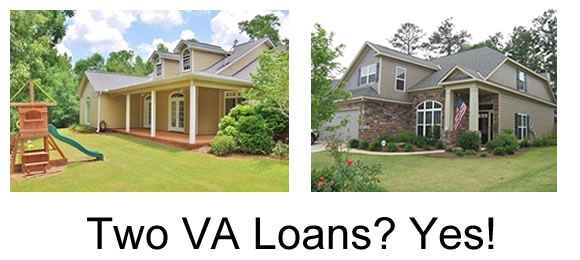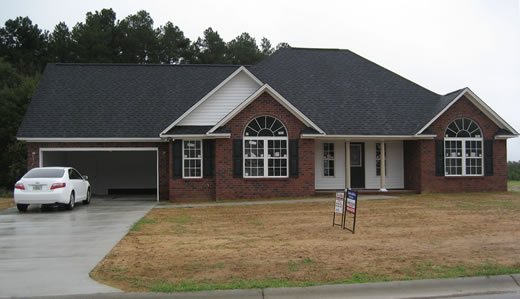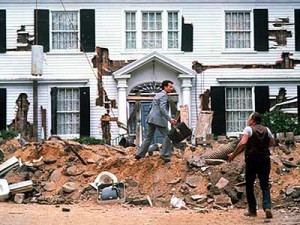 I’ve long held the assumption that you could only have one VA loan. I assumed you had to sell your first home or refinance before moving to a second. Well as a current holder of two VA loans, I can definitely tell you that you CAN take out two VA mortgages!
I’ve long held the assumption that you could only have one VA loan. I assumed you had to sell your first home or refinance before moving to a second. Well as a current holder of two VA loans, I can definitely tell you that you CAN take out two VA mortgages!
Why Two VA Loans?
My original VA loan was for a home near Shaw AFB. That property is financed with a low rate (2.25%), 15 year mortgage. The rental income almost covers the payment each month, but the loan is paying off fast! I did not want to sell the home but rather wanted to keep paying it off for a while to gain equity.
We did not plan on buying a home when we moved to Robins AFB, but after looking for several months we changed our mind. Rent is fairly high in Warner Robins and many nice, affordable homes were for sale that kept us well under BAH.
We had enough money for a small down payment on a house, but not the 20% that is typically required to avoid Private Mortgage Insurance (PMI), which can add over $100 per month to your mortgage. I was also unsure if we would qualify for an almost 100% financed home without VA.
VA Loan to the Rescue
The second VA loan gave us the 90% financing we were looking for, at a low interest rate. It did not have any effect on our previous VA loan.
We purchased an awesome 2,300 sq ft home in a nice neighborhood, with good schools.
Unfortunately, the second VA loan is not a completely new entitlement, but rather a remainder of what you originally spent on the first home.
How to Calculate Your Remaining VA Eligibility

Step 1: Calculate your maximum VA loan limit at your new base, which according to the VA is located here. For most areas this amount will be $417,000. Assuming I am moving to Robins AFB, my new loan limit for Houston County, GA, is $417,000.
Step 2: Subtract the loan value you started with to purchase you first home from the limit. So let’s say I purchased a home at Shaw AFB for $200,000. My VA eligibility at my new base is $417,000 – $200,000 = $217,000.
So the end result is after purchasing a $200,000 home near Shaw AFB, I can take out a second VA loan of up to $217,000 at Robins AFB.
To help understand this, the VA has some examples posted here. I have used a simple way to calculate remaining entitlement, but they are multiplying the same numbers by 25%, because technically that is how much of the loan the VA guarantees. Even though they use 25%, the numbers work out the same.
What if the Home I Want is More Than My Eligibility?

If the home you want to buy is over your remaining eligibility, you will have to make a down payment equal to 25% of the amount that is over. So from the previous example you saw my eligibility for Robins AFB was $217,000. The home we wanted to purchase was $240,000 or $23,000 over. So our required down payment was $23,000 x .25 = $5,750.
Why 25%? Technically, when the VA backs a loan for you, they are guaranteeing to pay 25% of the loan if you default. So in reality, your VA entitlement is $104,250, which can buy a $417,000 home. If you use buy a home at $200,000, technically you have $54,250 in VA eligibility left… and $54,250 can get you a $217,000 loan.
My Bank Says I Have Zero Eligibility
From my experience many banks do not understand how to calculate eligibility for a second VA loan. Additionally, when banks try to look up your VA certificate it will sometimes appear that you have zero eligibility remaining.
I initially tried to get a second loan with Pentagon Federal and they were adamant that I had already used my VA loan. I even talked to a supervisor and could not convince them of the process for a second VA loan. I finally cut my losses and went with Navy Federal who understood it completely.
Beware of the Higher VA Loan Funding Fees

Your first VA loan has a funding fee of 2.15% if you did not provide a down payment. Every VA loan after that has a funding fee of 3.3% funding fee. This is a fairly high fee, and for a $200,000 loan would be $6,600!
The fee applies even if you sold the first home and were not taking out two VA loans at one time. The fee can be financed into the loan, but I do not recommend it.
Let’s say you purchase a home worth $200,000 and finance the funding fee of 3.3%. So your beginning loan balance is $206,600. With a 30 year mortgage at 3.0%, your loan balance in three years will be $192,874. With a 6% realtor fee you would need to sell for at least $204,500 to break even.
The way to avoid this fee is to put at least 5% down. At 5% down your funding fee drops to 1.5%. So from the last paragraph, if we put down 5% ($10,000) but finance the funding fee, our beginning loan balance is $200,000 – (200,000 x .05) + (190,000 x .015) = $192,850.
Can I Take out More Than Two VA Loans?
Man you are greedy! Just kidding. From what I have read, technically you could take out as many loans as you want as long as you do not go over your VA eligibility.
So for most areas your entitlement is $417,000. You could purchase four homes at $100,000 each, all financed on VA loans. The catch is that you have to live in every one of those homes to get the initial loan. So that would have to be four separate assignments where you purchased homes at each.

